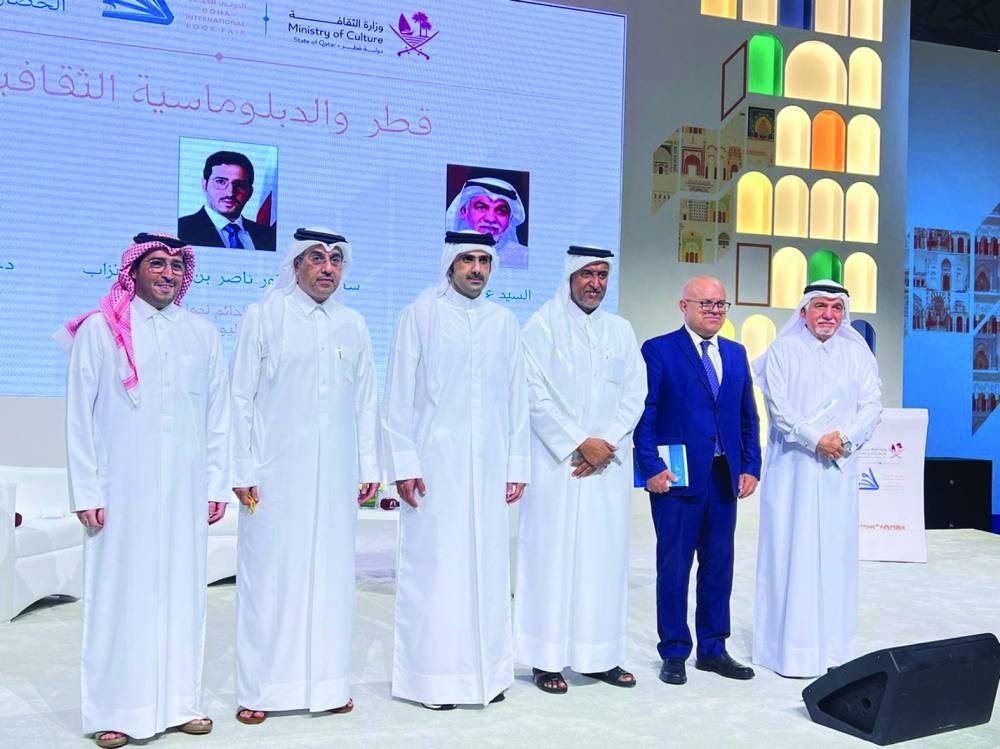As part of the cultural activities accompanying the 33rd Doha International Book Fair, the Ministry of Culture organised a symposium entitled "Qatar and Cultural Diplomacy" on Tuesday evening.
The symposium was attended by HE Minister of Culture Sheikh Abdulrahman bin Hamad al-Thani, dignitaries, intellectuals and the book fair audience.
HE Permanent Representative of Qatar to Unesco Dr Nasser bin Hamad al-Hanzab, and former Representative of Qatar to Unesco Ali Zainal participated in the symposium, moderated by Dr Nawzad Abdulrahman al-Haiti, a professor at the Diplomatic Institute and an economic consultant.
Zainal initially reviewed the ongoing efforts of Qatar to enhance its cultural diplomacy, which included many initiatives, the most recent of which was holding a celebration organised by the Ministry of Culture at the Unesco headquarters in the French capital, Paris, on the occasion of the 20th anniversary of the 2003 Convention for the Safeguarding and Protection of the Intangible Cultural Heritage. He also pointed out a number of other initiatives, the most important of which is the "Years of Culture", which began in 2012 with Japan, and which has included a large number of countries, continuing this year with Morocco, in addition to the establishment of the Arab Cultural House Al Diwan in the German capital, Berlin, which was launched during the Qatar-Germany Year of Culture 2017, and the Arc de Triomphe horse racing award, which is held in the French capital and is accompanied by many cultural events.
He also touched on the efforts of private institutions and individuals to enhance Qatari cultural diplomacy, citing in this context the "The Majlis - Cultures in Dialogue" initiative, which is a cultural exhibition that includes unique collections from the Sheikh Faisal Bin Qassim al-Thani Museum. Zainal called for Qatar to adopt the establishment of cultural centres in important international capitals within the framework of its interest in promoting Arab culture and spreading diplomatic culture.
HE Dr Nasser al-Hanzab discussed the early interest of Qatar in cultural diplomacy since the era of the Founder, Sheikh Jassim bin Mohammed bin Thani, who printed books at his own expense in India, and sent them to various countries to spread knowledge, which indicates the existence of an approach by Qatar in this regard and which continues to this day. He also referred to the establishment of the Sheikh Hamad Award for Translation and International Understanding and its role that confirms this approach, and what the award does in introducing cultures. It was also interested in signing an agreement with Unesco to translate its publications on the Silk Road.
He said that there is a political will in the country to introduce Qatari culture, praising at the same time the efforts of the Ministry of Culture at the local and international levels in this regard, including the culture exhibition that was held at the Unesco headquarters recently, which was attended by more than 300 diplomats around the world and constituted a turning point in introducing Qatari culture in a headquarters that includes representatives of various countries.
He also stressed that Qatar played a fundamental role in establishing international peace, security at the regional and international levels by establishing a culture of dialogue between people.
Qatar leads many international efforts in promoting peace and creating stability, especially within the scope of the work of the Unesco, which formulates international policies in achieving sustainable development goals. Qatar is a member of the Executive Council of Unesco, and chairs its Conventions and Recommendations, as a result of the cultural efforts of Qatar globally, he added.
He also noted that the goals of Unesco intersect with the Qatar National Vision 2030, which is concerned with culture and heritage, pointing out the Ministry of Culture's keenness to register a number of elements of intangible cultural heritage on the Unesco list, most notably the "bisht" and the Qatari "ardha".
Additionally, he pointed out the state's many initiatives to spread education in the world, including the "Educate a Child" initiative and the "Education Above All Foundation", which has adopted education for about 17mn children around the world, besides other initiatives that enhance the cultural diplomacy of Qatar. (QNA)

